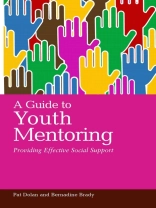Youth mentoring can be an effective way of supporting troubled youth, helping them sustain positive mental health, cope with stress, and lead successful lives through adolescence and into adulthood.
This book is a comprehensive guide to youth mentoring programmes, illustrating how, if managed well, they can increase the social support available to young people. It outlines the objectives and benefits of mentoring, how it works, and how to mentor successfully. Youth mentoring in community and school settings is covered, as well as mentoring for vulnerable youth. The book illustrates different mentoring models and provides practical strategies for assessing, setting up, and monitoring the mentoring relationship and its outcomes for the young person. The challenges and difficulties associated with mentoring programmes and strategies to overcome them are also addressed.
This will be an essential guide for anyone working with young people, including youth workers, social workers, residential care staff, foster carers, community development workers, teachers and community police.
Inhaltsverzeichnis
About the Authors. Introduction. 1. Understanding Social Support and Its Role in Youth Mentoring. 2. Assessing Social Support for Youth within a Mentoring Context. 3. Good Practice in Mentoring Programmes. 4. School-based Mentoring. 5. Providing Social Support through Mentoring for Specific Groups of Young People. Conclusion. Useful Contacts. Subject Index. Author Index.
Über den Autor
Bernadine Brady is Senior Researcher, Child and Family Research Centre, NUI Galway, Ireland. She was lead researcher on a major evaluation of the Big Brothers Big Sisters Programme in Ireland, an internationally renowned youth mentoring programme. Her research interests include youth mentoring, family welfare conferencing and children’s participation.












